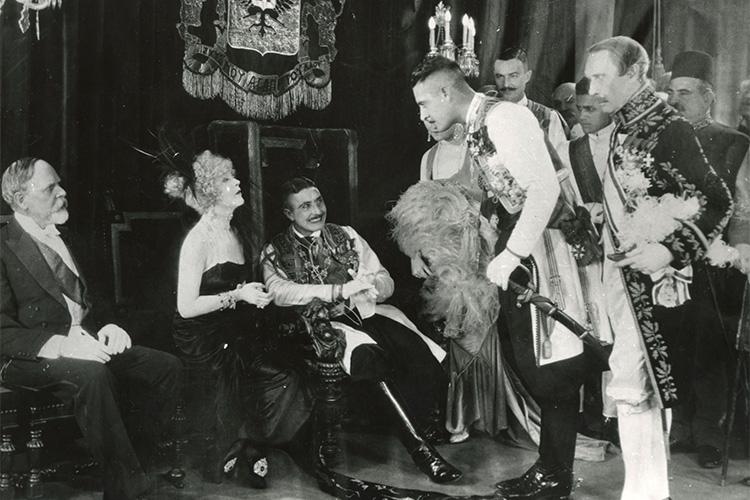The film is to be shown as a world premiere in a new version restored incorporating newly discovered materials.

Queen Kelly (1929) by Erich von Stroheim is the Pre-opening film of the 82nd Venice Film Festival
On Tuesday 26 August in the Sala Darsena (Lido di Venezia) with live music performed by the Syntax Ensemble.
Queen Kelly
Queen Kelly (1929), the legendary unfinished masterpiece by the great director (Foolish Wives, Greed) and actor (The Grand Illusion, Sunset Boulevard) Erich von Stroheim, produced by and starring the era’s most glamorous film star Gloria Swanson (Sunset Boulevard), is the film chosen for the Pre-opening night, on Tuesday August 26th 2025, of the 82nd Venice International Film Festival (27 August-6 September) of La Biennale di Venezia, to be held in Sala Darsena (Palazzo del Cinema) on the Lido. Queen Kelly will be shown as a world premiere in a new version restored incorporating newly discovered materials.
In 1985, Dennis Doros created a “reconstruction” of Queen Kelly that played at the Venice Film Festival that year and around the world in 35mm to great acclaim. Forty years later, he has returned to the film and — thanks to new research, access to original nitrate materials, and the tools of digital restoration — has created a new reimagining of this lost masterpiece.
The screening of Pre-opening night, on Tuesday August 26th at Sala Darsena, will be accompanied by a new original score by Eli Denson for the film Queen Kelly, performed live by the Syntax Ensemble — clarinets: Marco Ignoti, Riccardo Acciarino; harp: Elena Gorna; percussion: Dario Savron; cellos: Fernando Caida Greco, Martina Rudic, Arianna Di Martino, Luca Colardo; director: Pasquale Corrado.
It should have been a dream collaboration: a glamorous world-famous movie star (Gloria Swanson) and her financier lover (Joseph P. Kennedy) hire the most celebrated director of the time (Erich von Stroheim) to make a groundbreaking independent film. Instead, Queen Kelly was canceled mid-production. The movie was shot in sequence and after filming just a few of the scandalous African sequences, Gloria Swanson, the film’s star and producer, shut it down. This unfinished film — like Erich von Stroheim’s desecrated Greed —became Hollywood legend. Basing his reconstruction on von Stroheim’s original scripts, Dennis Doros has employed multiple techniques to recreate the film’s dénouement.
Synopsis / Restoration notes
Queen Kelly opens in the imaginary European country of Cobourg-Nassau, sometime before the first World War, where the vain and cruel Queen Regina V (Seena Owen) obsesses over her feckless fiancé (Walter Byron), Prince “Wild” Wolfram. When the dissolute prince encounters an innocent but flirtatious convent girl, Patricia Kelly (Gloria Swanson), he falls in love. Desperate to see her before his upcoming wedding to the Queen, he kidnaps Kelly and brings her to his rooms in the palace. When the Queen discovers the lovers, she whips the nightgowned girl and throws her out into the night. After an unsuccessful suicide attempt, Kelly returns to the convent, where she receives a telegram, summoning her to the bedside of her dying aunt (Florence Gibson) in Dar-es-Salaam, German East Africa. There, the innocent young girl is shocked to find herself in a seedy bordello. On her deathbed, Kelly’s aunt begs her niece to wed the syphilitic brothel owner, Jan (Tully Marshall).
*
In 1985, when Kino International (with Dennis Doros as the neophyte archivist) released the first “new” edition of Queen Kelly, it was promoted as a “restoration of Erich von Stroheim’s lost masterwork.” Recognizing that the restoration of a film that was never completed is an impossibility, Doros calls the 2025 release of Queen Kelly an improved re-imagining of what von Stroheim’s film could have looked like. Milestone is grateful for the participation of George Eastman Museum (primary source), the Library of Congress National Audio-Visual Conservation Center, the Harry Ransom Center, the Margaret Herrick Library, Paramount Pictures, and the John F. Kennedy Presidential Library and Museum for providing the original nitrate 35mm materials, photographs, and papers to used create this new version. Newly created intertitles are identified (“Milestone”). Milestone also thanks Metropolis Post in New York for digitally timing, stabilizing, and removing dust and scratches.
Director’s biography
Erich von Stroheim (1885–1957) was one of cinema’s most controversial figures — celebrated for his audacity, perfectionism, and excesses. Born Erich Oswald Stroheim in Vienna, he immigrated to the United States around 1909, rebranding himself with the aristocratic-sounding "von" and crafting a persona of a former Austro-Hungarian officer. His reinvention played well in World War I America, where he appeared onscreen as Teutonic villains (billed “The Man You Loved To Hate”) in films like Hearts of the World (1918) and The Hun Within (1918).
Von Stroheim transitioned to directing, developing a reputation as a visionary auteur with a meticulous eye for detail. His debut, Blind Husbands (1919), was a commercial and critical success. It marked the beginning of his recurring themes — lust, cruelty, obsession, and the hypocrisy and decadence of the upper class. His most ambitious project, Greed (1924), based on Frank Norris’s novel McTeague, originally ran over nine hours before MGM drastically cut it to just over two. The mutilated final release was a commercial failure, but Greed remains a touchstone of cinematic realism and moral intensity.
Von Stroheim’s perfectionism often clashed with studio executives. He demanded authentic sets, period-correct costumes, complex, often sordid, character portrayals, and multiple takes. When von Stroheim explained to Irving Thalberg that one of his characters had a foot fetish, the studio executive proclaimed, “And you have a fetish for footage!” His next films, including The Merry Widow (1925) and The Wedding March (1928), continued his pattern of artistic brilliance undermined by budget overruns and studio interference. His unfinished project Queen Kelly (1929), starring Gloria Swanson and produced by Joseph P. Kennedy, was halted mid-production due to clashes over content and vision, effectively ending his Hollywood directing career.
In the 1930s and 1940s, von Stroheim reinvented himself as a character actor in America and Europe, frequently playing aristocrats and villains, often copied from his own earlier persona. In 1937, he was magnificent as Captain von Rauffenstein in Jean Renoir’s Grand Illusion. His most memorable role came as the butler Max von Mayerling in Billy Wilder’s Sunset Boulevard (1950), a haunting self-reflection on faded glory that earned him an Academy Award nomination for Best Supporting Actor.
Erich von Stroheim died of cancer in 1957 in France. Though his directorial output was limited, his influence on cinematic realism, narrative structure, and auteur theory remains profound.
Credits
Milestone Films
In 1990, Dennis Doros and Amy Heller co-founded Milestone Films. Working with film archives and labs around the world, they have restored and distributed movies outside the mainstream including works by Charles Burnett, Billy Woodberry, Kathleen Collins, Erich von Stroheim, Ayoka Chenzira, Margot Benacerraf, Bridgett M. Davis, and Nancy Savoca. Milestone’s motto is “We like to mess with the canon.” Doros served two terms as the President of the Association of Moving Image Archivists and on the Board of the Co-ordinating Council of Audiovisual Archives Associations. In 2022, Dennis and Amy co-founded Missing Movies (www.missingmovies.org), an organization to help filmmakers clear their lost rights and find their original materials.
“Milestone Films is a small but mighty distribution company dedicated to discovering works that have been lost to history.” — Derrick Bryon Taylor, New York Times, May 12, 2025
“They care and they love movies.” — Martin Scorsese
Eli Denson
Eli Denson is an award-winning, LA-based composer, conductor, and orchestrator for film and television. His extensive musical training and deep wealth of cinematic language enables Denson to actualize the artistic visions of his collaborators. Grounded in these passion Denson has a compositional style that pushes musical boundaries while maintaining its roots in traditional scoring modalities. He is currently working with renowned composer Kevin Kiner on projects such as Dark Winds, House of David, NCIS: Origins, and Star Wars: Tales of the Underworld. In March 2025, his acclaimed score for the film #1 Bad Dad was premiered at the Director’s Guild of America as a part of his fellowship in Film Independent’s prestigious Project Involve program. Denson is also currently serving as music editor on the upcoming Lucasfilm Animation series Maul: Shadow Lord. His most recent project, a horror film entitled Laid Bare, received multiple nominations at the Pasadena International Film Festival. In 2024 he was awarded the Jon Vickers Scoring Award where he was tasked with creating a new original score for Milestone Film & Video’s restoration of the Erich von Stroheim film Queen Kelly. Denson received his graduate degree in Music Scoring for Visual Media from Indiana University’s Jacobs School of Music and his undergraduate degree in choral music education at Mississippi State University.
Director’s quotes
«And when the last scene will have been written and filmed, and the ink will have crusted on the pen-point, and the film will have turned brittle and the emulsion dried to cracking…and the money-changers will continue to run clashing after “new men”…I will be thinking of the grim long grind of the years of my life that I have put behind me, and of my work…that I have built up, reel by reel…sincere work…holding to it with clutched hands and clenched teeth. I shall be able to say:
“I never bargained… and I never took off my hat to convention nor fashion… and held it out for pennies… I have always told them the truth as I saw it… They liked it or they did not like it… But it was the truth anyway… as I saw it… And that clear conscience is my reward…”».
«If you live in France and you have written one good book, or painted one good picture, or directed one outstanding film, 50 years ago, and nothing ever since, you are still recognized as an artist and honored accordingly ... In Hollywood - in Hollywood, you're as good as your last picture. If you didn't have one in production in the last three months, you're forgotten, no matter what you have achieved ere this. It is that terrific, unfortunately necessary, egotism in the makeup of the people who make the cinema, it is the continuous endeavor for recognition, that continuous struggle for survival and supremacy, among the newcomers, that relegates the old-timers to the ashcan».
«The relations between Gloria and myself were before the picture, during the making and afterwards, and are still the most intimate and friendly ones. We never had the slightest arguments and all I can say is that she was the most charming and pliable star I ever had to work with».
«I recognize that, in those days, as now, I had my faults, and made my mistakes. Everybody does. Among my weaknesses from the studio’s point of view you might have reckoned my enthusiasm, my sincerity, and my thoroughness. I could not take up any subject with which I was not completely enthused, and when I did start on a job I became utterly absorbed in it until I had finished it in my own way. My sincerity demanded that I follow my own line of inspiration in whatever I might undertake. Call it pig-headedness if you like — others have done so — but I maintain that was my personal sincerity and a determination that, unless I could put my very best into any particular film, I wouldn’t touch it at any price. I never once worked for salary and salary alone. I should have enjoyed working equally hard. without being paid — if it had been possible for me to live in that way».
«The showing of Al Jolson’s first sound film stopped production on Queen Kelly. There was no other reason. Any stories of friction between myself and Gloria Swanson are entirely fictitious. We were then and have remained very good friends. We worked most amicably together recently in Hollywood on Sunset Boulevard, and Gloria was kind enough to lend me her New York apartment during my stay there in 1949. We are still the best of friends, and the fact that the film had to be abandoned was neither her fault or mine, but merely one of the many unhappy aspects of the invention of talking films. May I add that a score of other silent pictures were similarly stopped in the middle of production».
82nd Venice Film Festival
The 82nd Venice International Film Festival will take place at the Lido from August 27th to September 6th 2025, directed by Alberto Barbera.






